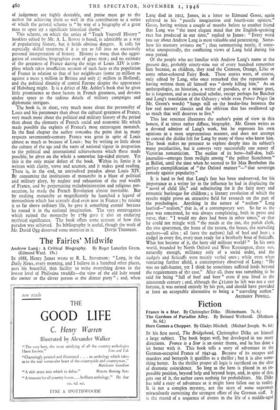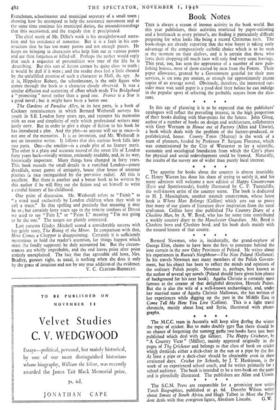Fiction
France is a Star. By Christopher Dilke. (Heinemann. 7s. 6.)
Here Comes a Chopper. By Gladys Mitchell. (Michael Joseph. 9s. 6d.) IN his first novel, The Bridgehead, Christopher Dilke set himself a large subject. The book began well, but developed in too many directions. France is a Star is an easier theme, and he has done a lot better with it. This book tells a story of adventure in the German-occupied France of 1942-44. Because of its escapes and murders and betrayals it qualifies as a thriller ; but it is also some- thing better. In the thriller proper all logic is sacrificed on the altar of dramatic coincidence. So long as the hero is placed in an im- possible position, beyond help and beyond hope, and, in spite of that, gets out of it, the author cares nothing for probabilities. Mr. Dile has told a story of adventure as it might have fallen out in reality. It is not a complex mystery, not the story of some superman miraculously outwitting the strongest effort of the German staff. It is the record of a sequence of events in the life of a middle-aged
Frenchman, schoolmaster and municipal secretary of a small town ; showing how he attempted to help the resistance movement and at the same time continue his municipal duties, the misunderstandings that this occasioned, and the tragedy that it precipitated.
The chief merit of Mr. Dilke's work is his straightforward narra- tion and his avoidance of nonsense. But it is a fault in his con- struction that he has too many pawns and not enough pieces. He keeps on bringing in characters who help him out at various points and are then forgotten or killed off. Perhaps the author would reply that such a sequence of personalities was true of the life he is describing. But this sort of fiction cannot be quite close to truth ; it would be dull if it were ; and the reader does feel a little cheated by the unfulfilled promise of such a character as Moll, the spy. As it is, Hippolyte Robert, the schoolmaster, is the only figure who comes through the book as a character closely observed. It was a similar diffusion and scattering of effort which made The Bridgehead a " promising" novel rather than a good one. France is a Star is a good novel ; but it might have been a better one.
The Gardens of Paradise Alley, in its best parts, is a book of Cockney reminiscences in which Bernard Wetherall surveys his youth in S.E. London forty years ago, and recounts his memories with an ease and simplicity of style which professional writers may justly envy. But in order to give a shape of fiction to his book he has introduced a plot. And the plot—as anyone will see at once—is not one of the memories. It is an invention, and, Mr. Wetherall is not an inventive writer. It follows that this curious book falls into two parts. One—the smaller—is a crude plot of no literary merit. The other is a plain and accurate record of the street life of London forty years back—vividly written, eminently readable, and, in its way, historically important. Many things have changed in forty years. This book records the small details in a vanished London—penny dreadfuls, street games of antiquity, house after house of amateur pianists (a race extinguished by the pervasive radio). All this is excellent. But there is another and a better book to be written by this author if he will fling out the fiction and set himself to write a careful history of his childhood.
One point of discussion. Mr. Wetherall refers to " Fainit " as "a word used exclusively by London children when they wish to call a truce." In that spelling and precisely that meaning it may be so ; but certainly forty years ago in the remote confines of Devon we used to say " Fain I," or " Fains I," meaning " I'm not going to be the one." The usages are plainly connected.
Last autumn Gladys Mitchell scored a considerable success with her grisly story, The Rising of the Moon. In comparison with that, Here Comes a Chopper is disappointing. Certainly it is sufficiently mysterious to hold the reader's attention, for things happen which must (he fondly supposes) be duly accounted for. But the circum- stances are wholly improbable, and the end leaves point after point entirely unexplained. The fact that that agreeable old hoax, Mrs. Bradley, guesses right, as usual, is nothing when she does it only by the grace of intuition and not by any true addition of the evidence.
V. C. CLINTON-BADDELEY.



































 Previous page
Previous page